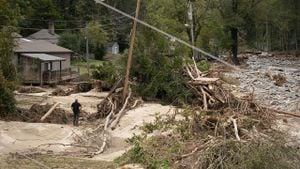Russian President Vladimir Putin has confirmed the nation's commitment to military power by approving a staggering $126 billion defense budget for 2025, which constitutes around one-third of the country's total government spending.
Announced on December 1, this budget emphasizes national defense as Russia continues to grapple with the prolonged conflict in Ukraine, which has unfolded over nearly three years. The approved amount reflects not only Russia's immediate military needs but also its broader strategic interests as it seeks to bolster its military readiness and capability.
The 2025 budget marks an increase of about $28 billion, compared to the previous year’s record defense spending, highlighting the fallout from the Russia-Ukraine war. The budget reveals significant shifts in priorities, with national security taking center stage amid mounting pressures both from external conflicts and internal economic strain.
According to insights from the Institute for the Study of War, the defense budget for 2025 is estimated to account for 41% of Russia’s overall annual expenditures. This massive allocation raises important strategic questions not only for Russia but across the geopolitical spectrum, particularly as tensions remain high with Western nations.
While the increase suggests dedicate efforts toward enhancing military capabilities, analysts caution against equalling expenditure levels to actual operational readiness. The Institute for the Study of War warns, "The increased Russian defense spending, though alarming, may not correspond directly to enhanced military capabilities," indicating possible inefficiencies or challenges within the Russian military framework.
Notably, much of the budget will apparently go toward personnel costs, including benefits for soldiers and veterans. This allocation suggests underlying challenges with recruitment and retention within the Russian forces—issues exacerbated by substantial battlefield losses incurred during the conflict.
The impact of this gigantic military budget isn't confined to defense matters alone. With economic statistics showing high inflation rates and labor shortages, concerns are rising about how such massive spending will affect other sectors of the Russian economy. The Central Bank of Russia has responded by raising interest rates dramatically, now at 21%, the highest level seen for decades. This move aims to curb inflation but also places additional strain on economic growth and stability.
Contrast this with Ukraine, where the cabinet has similarly prioritized defense, setting its 2025 military budget at approximately $53.52 billion. Ukrainian Defense Minister Rustem Umerov highlighted this focus on security as pivotal to countering Russian advances, asserting the continuous need for support from Western allies, who have played significant roles by supplying arms and humanitarian assistance.
The backdrop of this military escalation is the grinding nature of the conflict itself—a war characterized as one of attrition, where both Russia and Ukraine aim to wear each other down through prolonged engagements. Each side's resources, both human and material, have been heavily taxed. Despite facing troop shortages, Russia has sought reinforcements through alliances with nations such as North Korea. Reports indicate North Korea has provided manpower to bolster Russian forces, with around 11,000 North Korean soldiers allegedly active within Russia’s military operations.
Strikingly, this strategic partnership may have been necessitated by the significant recruitment challenges encountered by Russia, particularly highlighted during earlier mobilization efforts when many fled the country to evade conscription.
The situation becomes even murkier considering the economic and social costs of continued conflict, compounded by Russia’s reliance on foreign arms—North Korean weaponry has reportedly made its way to the battlefield, accounting for nearly one-third of ballistic missile fire directed at Ukraine this year, as tracked by Ukrainian defense sources.
Looking forward, the new budget indicates potential reductions slated for military spending by 2026 and 2027, implying some level of reevaluation of military engagement strategies, especially if the war continues to drain Russia's coffers. This signifies Moscow's recognition of the delicate balance it must maintain between military ambition and economic sustainability.
Meanwhile, as the war drags on, both sides face dwindling resources, raising the stakes for continued international support. Analysts agree the situation remains precarious, as strategies evolve on the battlefield and governments reassess their fiscal priorities against the backdrop of sustained combat.
What's clear is the defense budget approval sheds light on Russia's resolute stance on military empowerment, underlining its commitment to maintaining and potentially enhancing its presence on the world stage through powerful armed forces. The forthcoming years will likely indicate whether such investments translate to increased effectiveness or merely deepen Russia’s economic woes amid continuous military engagements.



